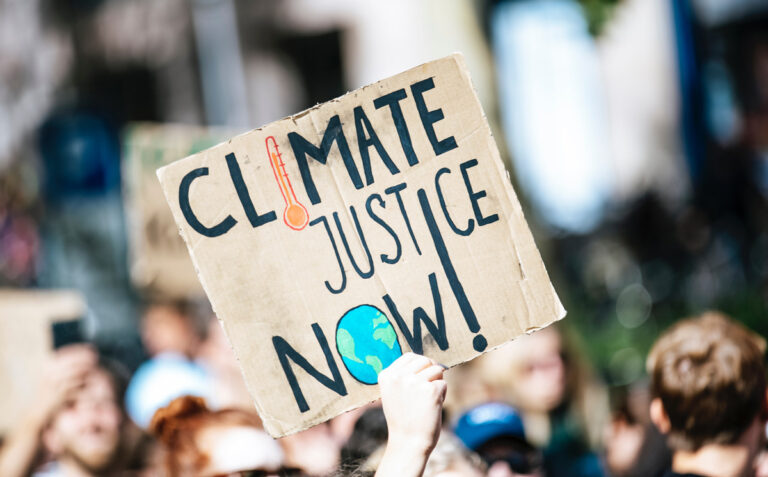A real-life ‘Don’t Look Up’: scientist arrested after tear-stricken warning ‘we’re headed for a fucking catastrophe’
On Wednesday 6 April, instead of going to work, NASA climate scientist Peter Kalmus went to a Chase Bank building in downtown Los Angeles along with three other scientists, and chained himself to the front doors. This protest aimed to bring more attention to the current state of the climate crisis and JP Morgan Chase’s role as the bank providing the most funding to fossil fuel companies. In a video that has now gone viral online, Kalmus is seen choking up as he warns his audience that “we’re gonna lose everything” and that the situation is “so bad,” he’s willing to put his career on the line for it.
He’s one of more than 1,200 scientists in 26 countries who demonstrated last week—and one of many who were arrested—after a recent climate change report from the Intergovernmental Panel on Climate Change (IPCC) revealed that, as Kalmus said in the clip, “we are headed towards a fucking catastrophe.” In a more subtle way, United Nations Secretary-General António Guterres described it as proof that the world is on “a fast track to climate disaster.”
A growing number of scientists are willing to risk arrest in a desperate bid to get leaders to act on the climate crisis. Listen to climate scientist Peter Kalmus @ClimateHuman choke up as he and others at @ScientistRebel1 block an entrance to @Chase in LA today.📷 via organizers pic.twitter.com/60qPe7RFuj
— Catrin Einhorn (@CatrinEinhorn) April 6, 2022
@elizmizon Here’s something the media aren’t covering: Scientists are taking to the streets and getting arrested for the climate movement, begging governments to act and begging the public to listen. #media #climatechange #extinctionrebellion #climateaction #climateemergency #mainstreammedia #scientistrebellion #bigoil #fossilfuels #fyp #viral #funny #learnontiktok Everyone follow @action4climate @ExtinctionRebellionXR @UN Climate Change
♬ Jazz Bossa Nova - TOKYO Lonesome Blue
@ncclimatejustice "We've been trying to warn you guys for so many decades that we're heading towards a fucking catastrophe, and we've been being ignored. The scientists of the world are being ignored, and it's got to stop. We're not joking. We're not lying. We're not exaggerating."#fup #fyp #climateaction #ipccreport #ipcc #climatejustice #climatechange #scientistrebellion #ImoniCarly #climateprotest #ipccreport #notadrill #dontlookup #fossilfuels
♬ As It Was - Harry Styles
About ten years ago, Kalmus made a career move from astrophysics to Earth science, leading him to quickly realise that the reality of climate science alone wasn’t enough to convince society to transform. He thus became an activist, helping organise Fridays for Future in the US, talking at city council meetings, and trying to drastically reduce his personal carbon footprint, by giving up flying among other things.
But, as society keeps hurtling towards more catastrophic climate impacts, Kalmus has become increasingly convinced that civil disobedience is necessary. And it seems like other scientists feel the same urgency. Kalmus was accompanied by physicist Greg Spooner, engineer Eric Gill, and wildlife educator Allan Chornak. The men are part of an international organisation of scientists called Scientist Rebellion, looking to raise awareness for the detrimental effects of climate change.
Indy100 reported that the scientists’ peaceful protest led to “at least 100” officers in riot gear arriving to arrest them. Excuse me, 100? Meanwhile, Fast Company managed to get an interview with Kalmus after his arrest, who shared that “we need to switch into emergency mode as a society.”
I was arrested for peaceful climate civil disobedience in front of the Chase building in LA to raise climate urgency with @theGregSpooner, Eric Gill, and Allan Chornak. The LAPD responded with at least 100 cops in riot gear #ScientistRebellion pic.twitter.com/6X1wVsH0sb
— Peter Kalmus (@ClimateHuman) April 8, 2022
@spencewuah i genuinely can not fathom how corrupt this world is #fyp
♬ original sound - spencer 💅
“Everything seems normal at some level, though it’s been a very not-normal few years,” he continued. “Earth breakdown is going to start kind of contributing very strongly to that sense of non-normalcy going forward. If the mainstream media is reporting this as just another story, if they’re talking about electric cars, and if the scientists are using scientific jargon and graphs and they don’t appear to be freaking out, I think the public looks at the journalists and looks at the scientists… and they’re not going to get the message that it’s an emergency.”
The IPCC report indicates that if world leaders don’t begin implementing drastic changes now—changes they’ve been promising for years yet never made an effort to integrate properly—this could be the imminent end of our planet, no less.
Scientists like Kalmus are hoping their effort to shed light on what’s happening and how urgent the situation is will inspire corporations and governments to begin cutting down greenhouse gas emissions quicker. But sadly, by looking at the poor amount of coverage this latest protest received in the media, it is clear they’ll need a helping hand from the rest of the public in order to make some noise.






